|
|
|
Sort Order |
|
|
|
Items / Page
|
|
|
|
|
|
|
| Srl | Item |
| 1 |
ID:
178233


|
|
|
|
|
| Summary/Abstract |
After almost 25 years of what could justifiably be called transformative change in South Africa, a truism is that the country’s new legal order, established by the Constitution in 1993 and 1996, provides the critical foundation of peace and security upon which its freedom has been built. The Constitutional Court was one of the most important of the new democratic institutions in the shaping of the country’s position as a constitutional democracy, upholding the values for which millions of people, black and white, had fought. This article is a brief reflection on the role of the Court in establishing the meaning of this democracy and giving it effect. The main goal of the article is to understand how the Court’s new jurisprudence works in particular contexts, how its work is related to crime and punishment, and what it means for the rights of marginalised groups in society. Using the examples of the Court’s decision in Makwanyane on the death penalty, and the Court’s decision on the findings of the Public Protector’s report on Nkandla, the article finds that the Court’s new jurisprudence takes quite a different view of legal developments in South Africa, insofar as the jurisprudence entrusts broad discretion to the Court and emphasises the need for sustained leadership of the Court to advance the battle for fundamental human rights, the rule of law, and democratic accountability.
|
|
|
|
|
|
|
|
|
|
|
|
|
|
|
|
| 2 |
ID:
093833
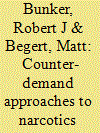

|
|
|
|
|
| Publication |
2010.
|
| Summary/Abstract |
The illegal narcotics demand in the US is discussed in relation to the products supplied by the Mexican cartels. This is then contrasted with major legal commodities with addictive properties consumed in the US. Overlaps of use are also noted. Traditional, right of center, and left of center counter-demand approaches to narcotics trafficking are also surveyed. All of these approaches represent no-win scenarios for the US with its 'troubled population' of addicted users. Final analysis suggests that a blended counter-demand strategy should be explored based on extinguishing demand, coercing the users, and, to some extent, fulfilling user demand by the provision of prescription narcotics to 'special status' addicts and by means of limited decriminalization of personal marijuana use. Such a suggested strategy would have its own negative elements and should be considered less of a bad choice than the other, even worse, US counter-demand policy options that exist.
|
|
|
|
|
|
|
|
|
|
|
|
|
|
|
|
| 3 |
ID:
082795
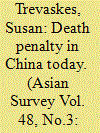

|
|
|
|
|
| Publication |
2008.
|
| Summary/Abstract |
This paper examines a recent debate at the highest level of China's politicolegal leadership on the application of the death penalty. The debate centers around the interpretation of a new criminal justice policy called "balancing leniency and severity" and around limiting the death penalty to all but the most egregious criminals
|
|
|
|
|
|
|
|
|
|
|
|
|
|
|
|
| 4 |
ID:
179101


|
|
|
|
|
| Summary/Abstract |
The death penalty has been the subject of controversy for a long time. South Asian countries have found themselves with this controversy by acquiring an ambivalent approach towards the death penalty. Out of eight South Asian countries, Afghanistan, Bangladesh, India and Pakistan retain the death penalty law, and firmly believe that the death penalty can deter people from committing future crimes, whereas Sri Lanka and Maldives have chosen to retain the death penalty law but have abolished it in practice. Conversely, Nepal and Bhutan are the only two countries that have abolished death penalty both in law and practice. In this context, this comparative study of death penalty trials explores the approach taken by the judiciary of two South Asian jurisdictions, Bangladesh and India, towards the death penalty. This paper utilizes the findings of two original empirical research projects that explored judges’ opinions on the retention and administration of the death penalty in both jurisdictions. Amnesty International death penalty reports along with the case judgements are used, which helped to portray the true approach and flaws in the death penalty trials in both the jurisdictions. The paper will assess the death penalty trials and approach of the different stakeholders in the trial to highlight the distinct approaches taken by the two jurisdictions towards the death penalty. The paper argues that in both countries there is inconsistency in sentencing, the social cry for justice is prioritized over convicts’ rights and, from judges to legal representatives, all the stakeholders involved in a criminal trial hold a convictive approach, making a criminal justice system which presumes justice is served by awarding the death penalty.
|
|
|
|
|
|
|
|
|
|
|
|
|
|
|
|
| 5 |
ID:
116671


|
|
|
| 6 |
ID:
079998


|
|
|
| 7 |
ID:
091106
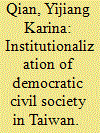

|
|
|
|
|
| Publication |
2009.
|
| Summary/Abstract |
A young democracy, Taiwan lacks agencies of horizontal accountability and aspects of a thick rule of law. This paper examines how an institutionalized, democratic civil society has held the antiquated judiciary vertically accountable for violations of due process in the famous Hsi-Chih Trio death penalty case.
|
|
|
|
|
|
|
|
|
|
|
|
|
|
|
|
| 8 |
ID:
131494


|
|
|
|
|
| Publication |
2014.
|
| Summary/Abstract |
Most U.S. state supreme court justices face elections or reappointment by elected officials, and research suggests that judicial campaigns have come to resemble those for other offices. We develop predictions on how selection systems should affect judicial decisions and test these predictions on an extensive dataset of death penalty decisions by state courts of last resort. Specifically, the data include over 12,000 decisions on over 2000 capital punishment cases decided between 1980 and 2006 in systems with partisan, nonpartisan, or retention elections or with reappointment. As predicted, the findings suggest that judges face the greatest pressure to uphold capital sentences in systems with nonpartisan ballots. Also as predicted, judges respond similarly to public opinion in systems with partisan elections or reappointment. Finally, the results indicate that the plebiscitary influences on judicial behavior emerge only after interest groups began achieving success at targeting justices for their decisions.
|
|
|
|
|
|
|
|
|
|
|
|
|
|
|
|
| 9 |
ID:
138916


|
|
|
|
|
| Summary/Abstract |
In this article we examine the debate among legal experts in China over the recent practice of death penalty criminal reconciliation (DPCR), which is a program that seeks to reconcile an offender convicted of a capital offense with the victim by requiring the offender to meet with, apologize, and pay economic compensation to the victim in exchange for a death sentence commuted to life in prison. Proponents of DPCR believe it provides important financial and emotional benefits to victims, helps rehabilitate offenders, and alleviates the wider social tensions generated by the offense committed. Opponents argue that DPCR violates the basic principle of equality before the law because the decisions reached using this process are sometimes influenced by public opinion and often biased toward those who can afford to pay compensation. These critics suggest that DPCR should be replaced with a comprehensive system of state compensation for victims of capital offenses.
|
|
|
|
|
|
|
|
|
|
|
|
|
|
|
|
| 10 |
ID:
144467
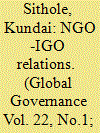

|
|
|
|
|
| Summary/Abstract |
This article draws on the previously unseen archival record to examine Amnesty International's contribution to the abolition of the death penalty in the Council of Europe legal space. The Parliamentary Assembly and the European Court of Human Rights' contributions are widely discussed in scholarly and policy circles alike, but Amnesty International's substantive contribution in the 1970s and in 1989 is less well documented. Political and legal actors in Strasbourg have significant control over the content and timing of international agreements, but in this case Amnesty International was decisive in shifting substantive considerations as to need for regional intervention to prohibit European states from exposing individuals to the death penalty. Of interest to policy students and international relations scholars alike, documenting Amnesty International activity also provides an illustration of nongovernmental actors' contribution to Strasbourg human rights policymaking over time and across a range of political and judicial actors.
|
|
|
|
|
|
|
|
|
|
|
|
|
|
|
|
| 11 |
ID:
179781
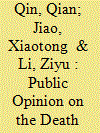

|
|
|
|
|
| Summary/Abstract |
Mainland China and Taiwan are two significant regions currently executing the death penalty; especially, Mainland China alone is believed to implement an amount of executions even larger than the total of all other countries. However, although Mainland China and Taiwan share the Chinese language, as well as traditional culture, the public’s opinions on the death penalty diverge. There is no evidence showing that more people are becoming abolitionists, albeit different social groups, domestic and overseas, are trying to propel the process of abolitionism. The public’s opinions on the death penalty are highly influenced by various factors, including cultural and historical ones, which are considered to be fundamental. Besides, the media, the public’s confidence in the judicial system, nationalism and international pressure also impact the public opinion. The governments of both Mainland China and Taiwan should take further actions in terms of the judicial system.
|
|
|
|
|
|
|
|
|
|
|
|
|
|
|
|
| 12 |
ID:
077066


|
|
|
|
|
| Publication |
2007.
|
| Summary/Abstract |
There is a substantial moralistic streak in U.S. elite attitudes about war against states perceived as evil. Among opinion leaders, death penalty supporters were substantially more likely than opponents to support the 1991 Gulf War, condone the Iraqi death toll, and favor escalating the war to topple Saddam Hussein. These relationships persist after controlling for ideology, nationalism, and instrumental beliefs about force and thus probably result from individual differences in retributiveness and humanitarianism, moral values known to underlie death penalty attitudes. Foreign policy expertise moderated this effect only on the regime change issue, and then only moderately, suggesting that "moral punitiveness" might also influence the thinking of decision makers. President George H. W. Bush evidently felt real moral outrage during the crisis about Iraq's aggression, but he refrained from escalating the war to punish Saddam more severely for it.
|
|
|
|
|
|
|
|
|
|
|
|
|
|
|
|
| 13 |
ID:
092198


|
|
|
|
|
| Publication |
2009.
|
| Summary/Abstract |
While Asia remains an exception to the global trend towards the abolition of capital punishment, South Korea has suspended executions for the past ten years. The purpose of this article is to explain the change in South Korea's death penalty practice, which is largely associated with democratic development and the observance of international human rights standards. Who are the leading figures in constructing and advancing abolitionist discourse and efforts in South Korean society? What are the major rationales for their advocacy? What significance does the possibility of South Korea's formal abolition have in terms of Asia's ongoing practice of the death penalty? This article seeks answers to these questions, highlighting South Korea's recent abolitionist movement.
|
|
|
|
|
|
|
|
|
|
|
|
|
|
|
|
| 14 |
ID:
168809


|
|
|
|
|
| Summary/Abstract |
The dominant paradigm in scholarship on death penalty law in India is doctrinal and empirical. There is an equally indispensable need for a third approach that focuses on the rhetoric of and in death penalty judgements. In the first part of the paper I argue why such an approach is necessary, and in the second part I instantiate this by a close reading of narrative techniques and rhetorical devices deployed in two recent Supreme Court judgements. I show the use of antirrhetic speech, ekphrasis and the ‘reality effect’ woven into the narrative of the taboo on incest, peopled with characters such as ‘diabolical monsters’ plotting ‘sinister designs’. Embedded in these narratives are judges who see themselves as reconstituting a community on the verge of breakdown. In this circular operation, monsters are linguistically created, and the monstrosity of the criminal is then used as a justification for death. Yet such a monster cannot be a wholly non-human figure because intent is necessary for fixing legal responsibility.
|
|
|
|
|
|
|
|
|
|
|
|
|
|
|
|
|
|
|
|
|